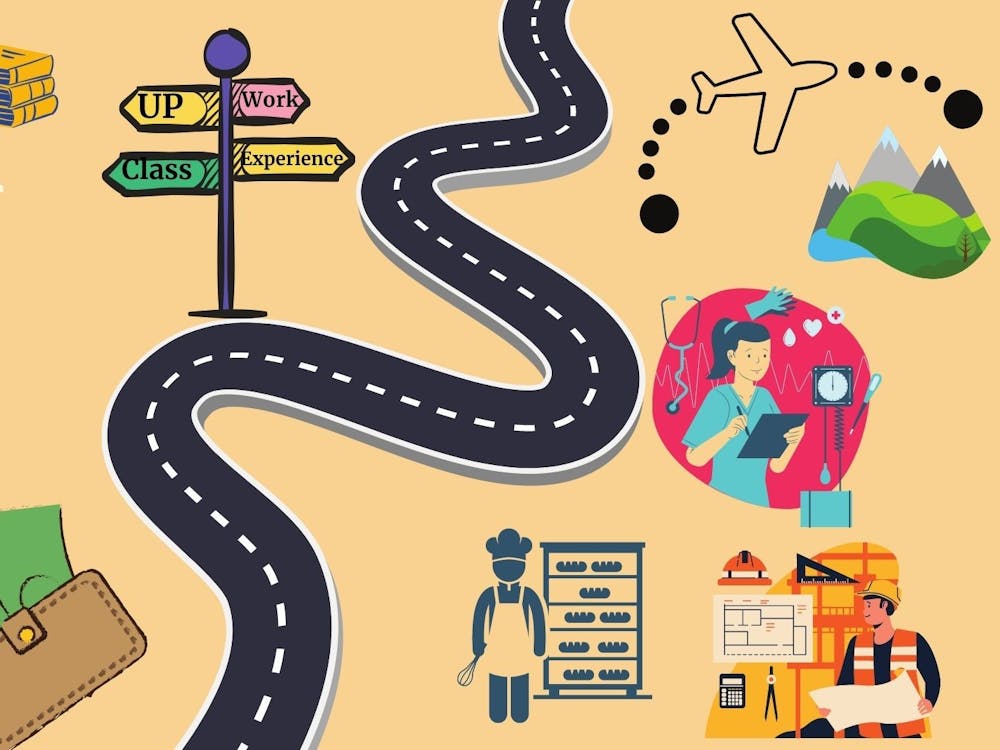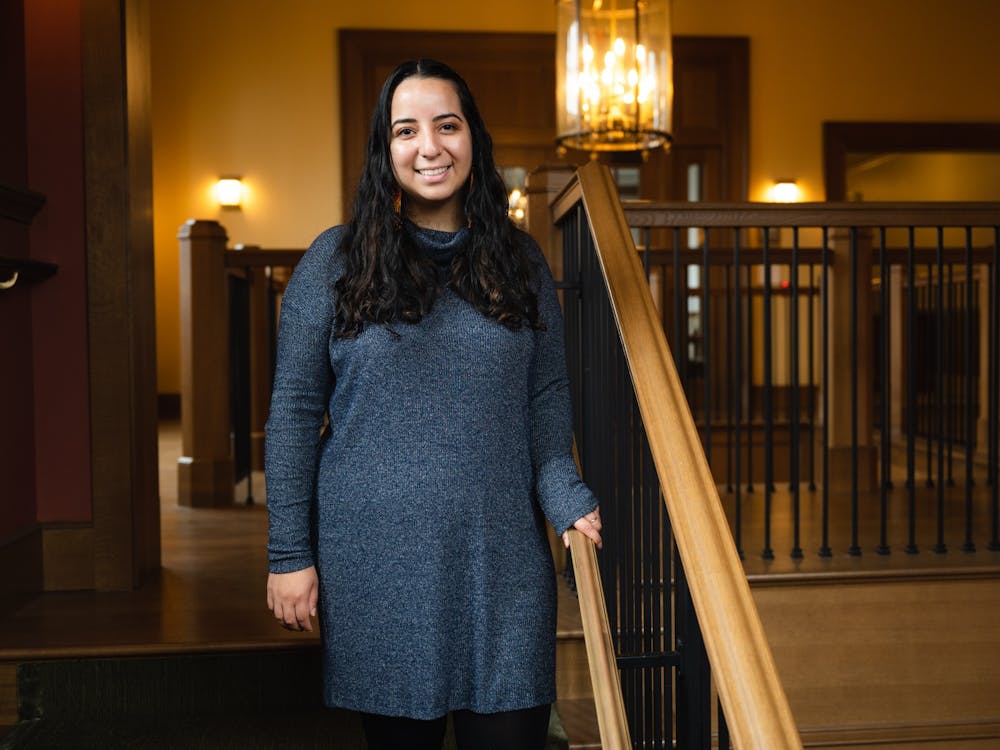With students at the University of Portland coming from all over the country and even internationally, diversity is something to recognize and be proud of. October is Filipino American History Month (FAHM), and to celebrate, The Beacon met with five Filipino American students and talked about their heritage, favorite Filipino dishes and much more.

Maria Lorienes Solis embodies Filipino culture through friendliness. She considers herself a "big hugger" and greets friends with hugs whenever she sees them.
Maria Lorienes Solis, junior nursing major from Beaverton, Oregon
Can you describe your Filipino background and how you identify with it?
I was born in the Philippines and I moved to America when I was seven, so I definitely still identify really strongly with my Filipino roots. Being part of FASA (Filipino American Student Association) and the culture here on campus has really helped me rediscover myself, and being with other people who have that same identity as me or are currently finding that same identity as me has been really helpful in trying to figure out who I am.
Since coming to UP, do you think this identification has changed?
I went to a public high school, so I definitely think it was more diverse. But my school didn’t have a Filipino club, so UP having that has been really helpful.
Why do you think it’s important to have FAHM?
I think it’s really important … but it just recently got recognized by the US government in 2015. So, acknowledging the contributions that Filipino Americans have made is super important, and so is recognizing all the people that have come before us.
How should we celebrate FAHM?
Before coming to UP, I didn’t really know this existed outside of social media. Having all of these events for it this year, like the food truck. Last year we had our previous faculty advisor come and talk to us about the overseas Filipino worker experience, because OFWs are a really big part of the Filipino experience. If you don’t know much about it, maybe (celebrate by) going to events we put on.
What’s your favorite Filipino food dish?
I like lechon. It’s like a huge grilled pig. It’s really yummy.
Do you have a favorite Filpino restaurant in Portland?
This place called Tambayan, it’s super authentic.

Jacob Saligumba is a sophomore business major. He holds his hands over his heart to represent family, one of his favorite aspects of Filipino culture.
Jacob Saligumba, sophomore operations and technology management major from Portland, Oregon
Can you describe your Filipino background and how you identify with it?
My parents are Filipino, and because of this I identify as hardworking, really motivated and focusing on my relationships with people. I really value the pride that we as Filipinos come with, because I feel that we’re always very prideful and proud of where we came from. I’ve grown up in Portland my whole life, and going to a public high school, I was able to see some diversity and others who I could relate to. But I’ve been around so many more since I’ve come to school at UP.
Since coming to UP, do you think this identification has changed?
I think that it’s progressed a lot because I’m around a lot more Filipino people that identify the same way that I do. Before I just felt very Americanized, and very white American, and I guess being around this type of community has allowed me to be even more prideful about who I am and discover more about my culture and heritage and where I’m from.
Why do you think it’s important to have FAHM?
It builds our community even further than it does. It raises awareness of who we are, what we stand for, and what we want to accomplish. I think it’s important for us Filipinos to be proud of who we are and share that with other people.
What’s your favorite Filipino food dish?
Lumpia, hands down. They’re like spring rolls, and my mom makes the best ones, they’re so good.

Sabrina Legaspi is a senior psychology and sociology major. She embodies what it means to be Filipino through being resilient and hard working.
Sabrina Legaspi, senior psychology and sociology major from Los Angeles, California
Can you describe your Filipino background and how you identify with it?
I identify as full Filipino, and first generation; (my) parents were born and raised in the Philippines. Growing up it was kind of a conflicted identity because my parents and I both don’t really look Filipino, and I don’t have the dark skin or really fit the stereotype. I also grew up in a predominantly white neighborhood, but then I also had a lot of Filipino family friends, and when I was with them, I didn’t feel like as Filipino as them.
Growing up, I learned a lot more about what it means to be Filipino. We’re very resilient, proud and hardworking. I kind of try to embody that in myself, just kind of drawing the energy of our people rather than making myself look like something I’m not.
Since coming to UP, do you think this identification has changed?
Coming to UP was very different for me because it’s not as diverse as LA. Coming here, I kind of wanted to get involved in the Filpino community, and that’s why I joined FASA. It really made me feel more at home, especially being homesick my freshman year. I felt very different from people, and a lot of people felt the same way.
Why do you think it’s important to have FAHM?
I think it’s really important to emphasize that it’s Filipino American and also history. It’s not heritage, and Filipinos have a history and they have a place in America, like they’ve been involved in WWII, they've gone through so much colonization. A lot of people don't know that they were part of the American Farm Works with Cesar Chaves. I feel it’s very important that we acknowledge all of the history and their part that they’ve had in this country.
What’s your favorite Filipino food dish?
My favorite is called Puchero, it’s kind of like a soup but it has like different meats in it, like ham and pork and chicken, and also has like bananas and carrots in it, so it’s kind of like a sweet and savory mix of a soupi.
Do you have a favorite Filpino restaurant in Portland?
I haven’t really tried many in Portland, it’s kind of hard for me to find authentic ones. A lot of the food here is like fusion, and I want to find something that reminds me of home. I often cook myself Filipino food.

Allison Abad is a freshman civil engineering major. She is proud of her Filipino heritage, and believes that pride is one of the defining aspects of her culture.
Allison Abad, freshman civil engineering major from Seattle, Washington
Can you describe your Filipino background and how you identify with it?
I guess it took me a while to really know and understand what it meant to be Filipino American because growing up I was always around my family and all that, so I didn't really realize that it was a thing that I could have a lot of value in. As I got older, I made more connections with people and the history of the Philippines and how my family came here from the Philippines. My mom was born there and I never really realized all of that until I was well into high school. It wasn’t until then that I started really taking pride in my heritage.
Since coming to UP, do you think this identification has changed?
For sure, I think so. Coming to UP I was kind of scared because I already had a pretty solid group back home, and I could relate to my friends culturally. After coming to UP, it made me take more pride in that, and just being around this environment I find myself relating to a lot more people than I thought I would.
Why do you think it’s important to have FAHM?
For me, I think it’s important to celebrate this month by kind of bringing awareness, even to those who aren’t Filipino. I heard about it growing up (and I was) like ‘Okay that’s cool,’ but I didn’t really understand what that meant until I was older, and I think just instilling that in people growing up and just making sure that they know this is where they come from and this is how far we’ve come as individuals, families, and how much our background has contributed to where we are now.
What’s your favorite Filipino food dish?
Ooh, yes, it’s this like street type dish, it’s called taho, and it’s like warm and sweet and good and I love it.

Damien Tabilin is a junior nursing major. He believes that optimism and hospitality are two defining traits of his heritage.
Damien Tabilin, junior nursing major from Pearl City, Hawaii
Can you describe your Filipino background and how you identify with it?
Well growing up, I was pretty much like always used to being a minority, but the minority was always a majority, because in Hawaii there’s a melting pot of cultures. So I was very close to my Filipino heritage growing up. My whole family immigrated to Hawaii in the plantation days, and that’s how we were able to start a new life there, and even from a young age I’ve always been very in touch with it. The food, the family, the hospitality and everything else. I share a lot of morals and values of Filipino culture, like the hospitality, or the family oriented mindset, very willing to do whatever to sacrifice for others, willing to put others before them, always working hard.
Since coming to UP, do you think this identification has changed?
Honestly I feel like coming here was kind of rough adjusting to the new environment because it was my first time being in the minority, so when I became the minority, it was really hard to adjust, but at the end of the day I still felt very in touch with my Filipino background, like the whole hardworking and the hospitality aspect of it. I didn't really change as a person, I’ve just grown a little bit more.
Why do you think it’s important to have FAHM?
I know that for FAHM, it was only recognized a few years ago, like a pretty new and recent thing. At the end of the day, Filipinos have helped to build the world to what it is today, especially in America and other countries worldwide. A lot of Filipinos help to fight in our military and all that, so I think one way to celebrate it is to respect the culture and immerse yourself into something that you’re not really familiar with, like trying new foods and being open minded to what diversity can bring to the table.
What’s your favorite Filipino food dish?
Oh my goodness, this is hard … Growing up I loved all the crazy things, I love everything honestly. I’m gonna have to pass, just put everything.
Is there anything else you would like to say?
I just want to say, I think diversity is such an important thing, and being able to respect people’s backgrounds and point of views and perspectives is something that can change the world and make it a better place. I think people of color should really be celebrated more and not just be in the shadows.
Carlos Fuentes is a reporter for The Beacon. He can be reached at fuentes22@up.edu.








